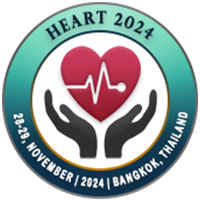
Elena Alonso Villa
INiBICA, SpainTitle: MIR-130B-3P AND PPAR?: Protective role against lipotoxicity in cardiomyocytes
Abstract
The heart is the most energy-demanding tissue of the body and utilizes fatty acids (FAs) for ATP generation. However, excess lipid accumulation in adult cardiomyocytes conduces to lipotoxicity, accompanied by overproduction of reactive oxygen species (ROS), and to cardiac dysfunction. It is well documented that peroxisome proliferator-activated receptor gamma (PPAR?) modulates genes expression involved in uptake, storage, oxidation and synthesis of FA. Cardiomyocyte-specific overexpression of PPAR? causes dilated cardiomyopathy associated to lipotoxicity in mice. In this context, we have previously demonstrated that miR-130b-30 is downregulated in plasma of idiopathic DCM patients. Analysis in silico show PPAR? as potential target of miR-130b-3p, however whether miR-130b-3p may modulate lipotoxicity via PPAR? is still unknown. AC16 cells were transfected with miR-130b-3p mimic and supplemented with Palmitate (PA), as in vitro lipotoxicity model. PPAR? and downstream PPAR? expression levels were estimated by qRT-PCR. Mitochondrial oxidated stress status was assessed by MitoTracker Green together with Redox-Sensor. Our results showed that overexpression of miR-130b-3p rescued PA-induced PPAR? expression. CD36, PLIN2, FASN and CPT1B expression were upregulated in PA condition but miR-130b-3p mimic presence significantly reverted the increased levels of CD36, PLIN2 and CPT1B. In agreement, the oxidative stress intensity was higher upon PA treatment and alleviated with miR-130b-3p overexpression. These findings suggest that miR-130b-3p may exert a protector role against PA-induced lipotoxicity and associated damage in human cardiomyocytes through modulation of PPAR signaling pathway.
Biography
My name is Elena Alonso Villa. I studied Biology at the University of Extremadura and a Master's degree in Biomedicine at the University of Cadiz. During the master's degree I did my master's thesis internship in Dr. Carmen Castro's research group, where I learned techniques such as stem cell culture, immunocytochemistry and enzyme activity assays. I gained experience in cryostat handling, fluorescence microscopy and confocal microscopy. In addition, I learned surgical techniques in murine models and their postmortem analysis. At the end of the master's degree I started my contract as a PhD student in Dr. Rocío Toro's research group, in the project "Advancing towards new therapeutic alternatives in idiopathic dilated cardiomyopathy through non-coding RNAs". Since I joined, I have learnt cell culture and molecular biology techniques such as qPCR, Western Blot or cell viability assays. In addition, I have acquired experience in the collection and processing of human samples and the use of editing, analysis and statistical programmes. I have presented several communications at national conferences and have
published two papers in Q1 journals.

